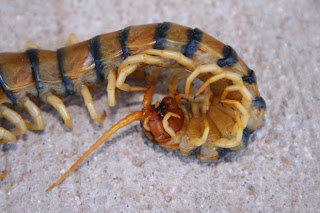The life cycle of centipedes is quite intriguing because their reproduction does not involve mating. What actually happens is that, male centipedes simply deposits their "spermatophore" for the female centipedes to take. So when a female centipede took a spermatophore, she will place them into her web.
At some instances, some male centipedes does a courtship dance which is to encourage the female centipedes to take their sperm. But sometimes, some male centipedes would just simply leave their spermatophore for the female centipedes to find.
Female Centipedes' Care for their Eggs
After a female centipede took in the spermatophore that she needs, she will deposit the eggs into the small holes in the soil that she made. The next step is for her to cover those holes (with eggs) with soil to insure their protection against other predators.
Female centipedes can take care a number of eggs ranging from a minimum of ten to a maximum of fifty eggs. And depending on the embryo, it can take them one to three months period to hatch.
Centipedes are very maternal and paternal. After the female centipede lay her eggs and bury them into the soil, she will frequently check on them to keep them safe from predators or other insects. She will also often lick her eggs to prevent the growth of fungi.
Once the eggs have hatched, the mother centipede will stay to protect her young until they are ready to leave on their own survival.
If it happens that the mother centipede has been interrupted by someone or something in the process of burying her eggs, she will either eat them all or leave them on their own demise. In most cases, they get rotten by fungi.
Centipede Reproduction
Centipedes have a pretty short reproductive life. They are only able to reproduce for a year. Sometimes, they can reproduce up to two years but generally, most centipedes are able to reproduce for up to 12 months period.
(At four months old, centipedes tends to become sexually matured.)
Unlike other common insects, centipedes have a lifespan of five to six years of age making them as one of the longest living species of insect around the world. And, it's also the reason why centipedes makes a good pet.

Moreover, the life cycle of centipedes may change as some scientists has confirmed that they are still undergoing a process of evolution. They are actually discovering newly evolve species of centipedes on a yearly basis.
At some instances, some male centipedes does a courtship dance which is to encourage the female centipedes to take their sperm. But sometimes, some male centipedes would just simply leave their spermatophore for the female centipedes to find.
Female Centipedes' Care for their Eggs
After a female centipede took in the spermatophore that she needs, she will deposit the eggs into the small holes in the soil that she made. The next step is for her to cover those holes (with eggs) with soil to insure their protection against other predators.
Female centipedes can take care a number of eggs ranging from a minimum of ten to a maximum of fifty eggs. And depending on the embryo, it can take them one to three months period to hatch.
Centipedes are very maternal and paternal. After the female centipede lay her eggs and bury them into the soil, she will frequently check on them to keep them safe from predators or other insects. She will also often lick her eggs to prevent the growth of fungi.
Once the eggs have hatched, the mother centipede will stay to protect her young until they are ready to leave on their own survival.
If it happens that the mother centipede has been interrupted by someone or something in the process of burying her eggs, she will either eat them all or leave them on their own demise. In most cases, they get rotten by fungi.
Centipede Reproduction
Centipedes have a pretty short reproductive life. They are only able to reproduce for a year. Sometimes, they can reproduce up to two years but generally, most centipedes are able to reproduce for up to 12 months period.
(At four months old, centipedes tends to become sexually matured.)
Unlike other common insects, centipedes have a lifespan of five to six years of age making them as one of the longest living species of insect around the world. And, it's also the reason why centipedes makes a good pet.

Moreover, the life cycle of centipedes may change as some scientists has confirmed that they are still undergoing a process of evolution. They are actually discovering newly evolve species of centipedes on a yearly basis.
No comments:
Post a Comment